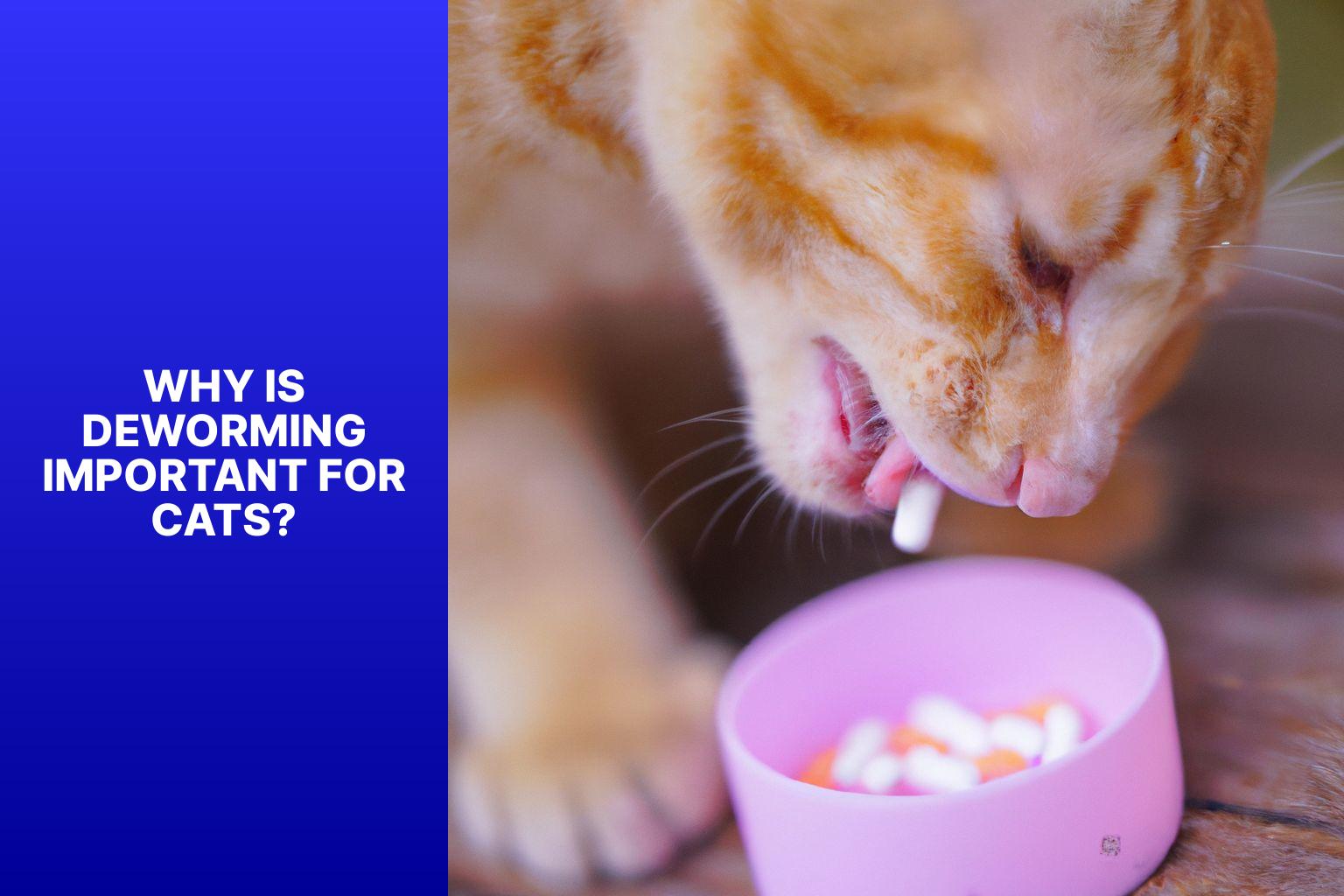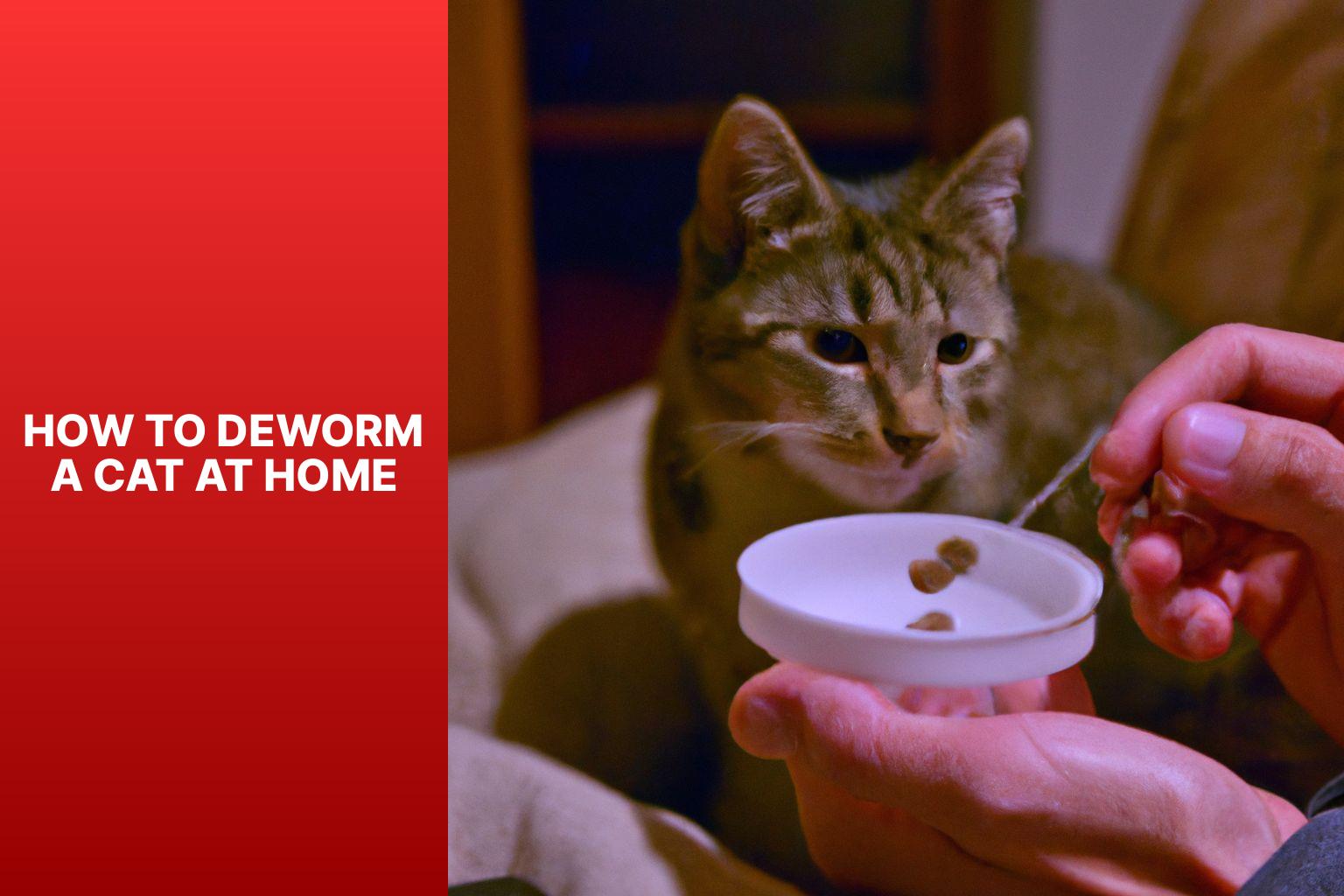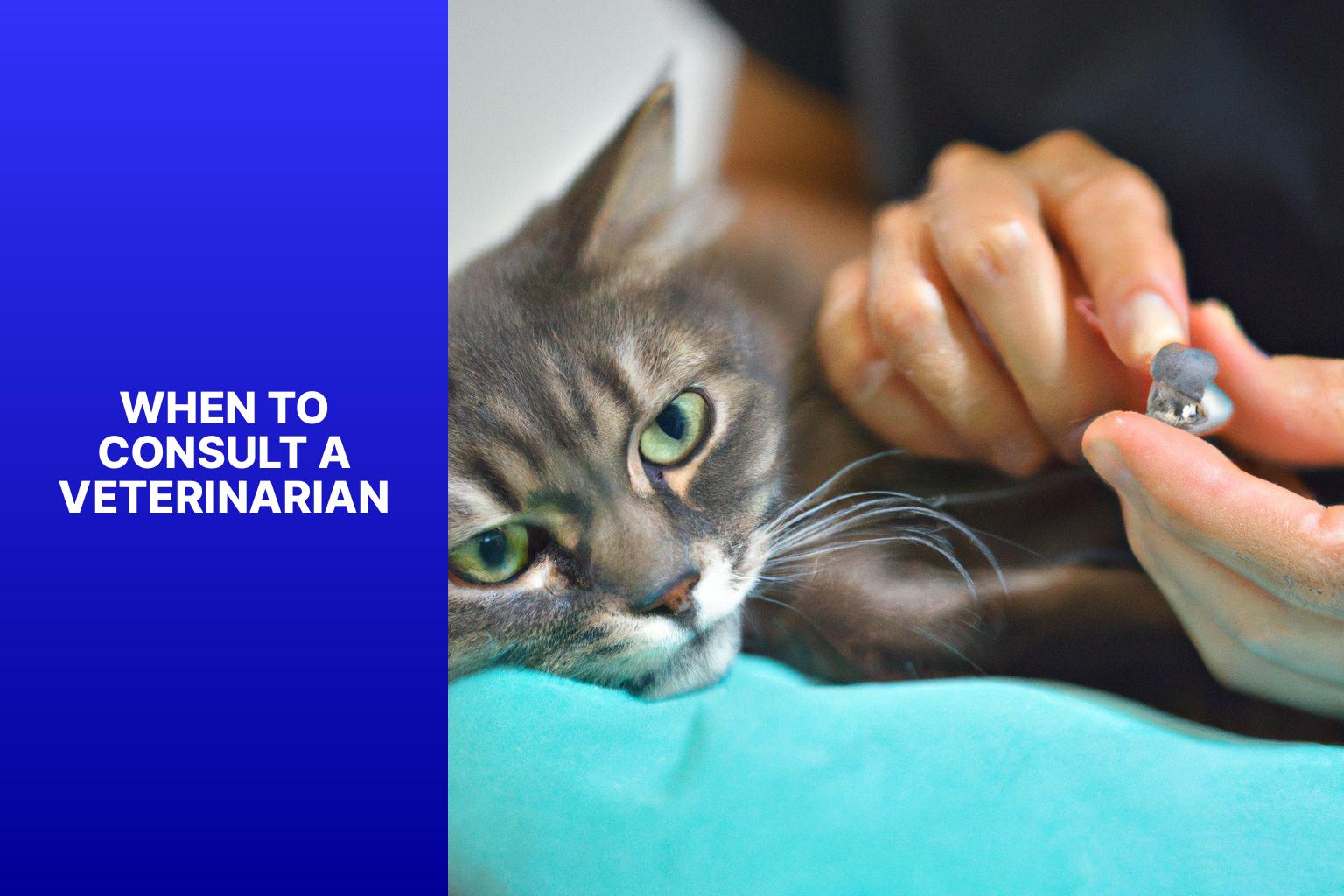Cat deworming is an essential aspect of responsible pet ownership and plays a crucial role in maintaining the health and well-being of your feline companion. Understanding the importance of deworming and the methods involved is vital for every cat owner. This article aims to provide a comprehensive guide on how to deworm a cat and what to expect during the process.
Deworming is important for cats as they are prone to various types of internal parasites, commonly known as worms. These worms can cause a range of health issues and discomfort for your cat, including digestive problems, nutritional deficiencies, weight loss, and even organ damage. By deworming your cat, you are helping to eliminate these parasites and protect their overall health.
Different types of worms can affect cats, including roundworms, tapeworms, hookworms, and more. Each type of worm requires specific treatment and prevention methods.
There are two main methods of deworming a cat: over-the-counter dewormers and prescription dewormers. Over-the-counter options are available at pet stores, while prescription dewormers are prescribed by veterinarians for more severe cases or specific types of worms.
If you prefer to deworm your cat at home, it’s important to follow the proper procedure. This includes administering the dewormer medication correctly and ensuring your cat receives the appropriate dosage based on their weight and the type of worm being treated. Tips for easier administration can also help make the process smoother and less stressful for both you and your cat.
Signs of successful deworming include the absence of visible worms in your cat’s feces, improved appetite, weight gain, and overall improved health and vitality. It’s crucial to implement preventive measures to avoid reinfestation. Regular vet check-ups and deworming schedules, as well as proper hygiene and sanitation practices, can help keep your cat worm-free.
While deworming your cat at home is generally safe and effective, there are instances where it is necessary to consult a veterinarian. If your cat displays severe symptoms, if they have a specific type of worm that requires prescription medication, or if you are unsure about the correct deworming process, it is best to seek professional veterinary advice.
By understanding the basics of cat deworming, you can ensure the well-being and happiness of your beloved feline companion.
Key takeaway:
- Understanding Cat Deworming: Cat deworming is important for maintaining the health and well-being of our feline friends.
- Methods of Deworming a Cat: Over-the-counter and prescription dewormers are available for treating worms in cats.
- How to Deworm a Cat at Home: Follow a step-by-step guide for administering dewormer medication and consider tips for easier administration.
Understanding Cat Deworming
Understanding Cat Deworming
1. Types of cat worms: Cats can be affected by roundworms, tapeworms, hookworms, and whipworms.
2. Symptoms of worm infestation: Common signs of worm infestation in cats include vomiting, diarrhea, weight loss, a bloated belly, and poor coat condition.
3. Importance of deworming: Deworming keeps cats healthy and prevents the spread of parasites to other animals and humans.
4. Frequency of deworming: Kittens should be dewormed every two weeks until three months old, then monthly until six months old. Adult cats should be dewormed at least twice a year or as recommended by the veterinarian.
5. Types of deworming treatments: Deworming treatments include oral medications, topical treatments, and injectables, depending on the type of worms and the cat’s age.
6. Prevention: Regularly clean the cat’s litter box, practice good hygiene, and avoid allowing the cat to hunt or come into contact with potentially contaminated feces.
7. Fact: About 45% of cats have intestinal parasites at any given time, emphasizing the importance of regular deworming for your cat’s well-being.
Why Is Deworming Important for Cats?
Photo Credits: Www.Catcornerblog.Com by Vincent Smith
Deworming is important for cats to prevent and treat internal parasite infestations, like worms. These parasites can cause weight loss, diarrhea, vomiting, and anemia in cats. Deworming is crucial for overall well-being and longevity.
Regular deworming is especially important for kittens, who are more susceptible to parasites and can suffer severe consequences. Kittens should be dewormed starting at two weeks old, then every two weeks until three months old, and monthly until six months. Adult cats should be dewormed at least every three months, or more often if they are at a higher risk (e.g. outdoor cats or hunting history).
Deworming your cat prevents parasite spread to other pets and reduces contamination from infected feces. It’s an essential part of responsible pet ownership and keeps your cat healthy and parasite-free.
Whiskers, a cat, was adopted by a loving family. Unaware of the importance of deworming, they neglected it. Whiskers started losing weight, became lethargic, and had digestive issues. The family took Whiskers to the veterinarian, who diagnosed a severe intestinal worm infestation. Whiskers needed extensive treatment and recovery. This experience taught the family the importance of regular deworming for their pets’ well-being.
What Are the Common Types of Worms in Cats?
There are several common types of worms in cats. These include:
1. Roundworms: They are the most common intestinal parasite in cats. They can be transmitted through infected feces, contaminated soil, or from mother cats to their kittens. Symptoms may include diarrhea, vomiting, and a pot-bellied appearance in kittens.
2. Tapeworms: Cats usually get tapeworms by ingesting fleas or small rodents that carry the parasite. These worms appear as small rice-like segments in the cat’s stool or around its anus. Cats may scoot their bottoms on the ground or experience weight loss.
3. Hookworms: They are blood-sucking parasites that can be contracted by ingesting larvae from contaminated soil or through skin penetration. Symptoms may include anemia, weight loss, and bloody or tarry stools.
4. Whipworms: They infect the large intestine of cats and can be contracted through ingesting eggs from the environment. They may cause chronic diarrhea, weight loss, and general discomfort.
5. Heartworms: Cats can also be infected with heartworms, which are transmitted through mosquito bites and primarily affect the heart and lungs. Symptoms can include coughing, difficulty breathing, and lethargy.
It is important to consult a veterinarian for an accurate diagnosis and treatment if you suspect your cat may have worms. Regular deworming and preventative measures, such as good hygiene and regular check-ups, can help protect your cat from these common parasites.
Methods of Deworming a Cat
Deworming your cat is crucial for their health and well-being. In this section, we’ll dive into different methods of deworming that you can explore. From over-the-counter dewormers to prescription options, we’ve got you covered. Discover how these methods can help eliminate those pesky parasites and keep your feline friend healthy and happy. No more worries about worms – let’s dig into the solutions!
1. Over-the-Counter Dewormers
When deworming your cat, it is important to consider using over-the-counter dewormers that effectively eliminate common types of worms. Here is a list of such dewormers:
- Pyrantel Pamoate: This dewormer is able to eliminate roundworms and hookworms by paralyzing them, which ultimately causes them to be expelled from the cat’s body.
- Fenbendazole: Another type of dewormer, fenbendazole, has the ability to eliminate a wide range of worms, including roundworms, hookworms, and tapeworms. Its mode of action involves inhibiting the worms’ metabolism, ultimately leading to their elimination.
- Praziquantel: Specifically designed to target tapeworms, this dewormer works by damaging the tapeworm’s skin, leading to its disintegration and elimination.
While over-the-counter dewormers can be effective, it is crucial to follow the instructions provided on the packaging and administer the correct dosage based on your cat’s weight. If your cat’s infestation is severe or if you are uncertain about the proper treatment, it is always advisable to consult a veterinarian for guidance.
Regular deworming is essential for maintaining your cat’s health and overall well-being. Make sure to use over-the-counter dewormers as directed and practice proper hygiene to keep your cat free from worms and ensure their overall welfare.
2. Prescription Dewormers
Prescription dewormers are specialized medications that effectively treat worms in cats. They require a veterinarian’s prescription. Here is a table outlining common prescription dewormers for cats:
| Dewormer | Active Ingredient | Administration | Recommended Dosage |
| Drontal | Praziquantel, Pyrantel Pamoate | Oral tablet | 1 tablet per 4kg of body weight |
| Profender | Emodepside, Praziquantel | Topical application | 1 tube for 2.2-5.5lb cats, 2 tubes for 5.6-11lb cats |
| Milbemax | Milbemycin Oxime, Praziquantel | Oral tablet | 1 tablet per 4.4-8.8lb of body weight |
Prescription dewormers are more potent and targeted compared to over-the-counter options. They effectively eliminate specific types of worms such as roundworms, hookworms, and tapeworms. To achieve optimal results, it’s important to follow the veterinarian’s instructions for dosage and administration. These prescription dewormers come in user-friendly forms like tablets or topical applications. Regular deworming with prescription medication helps keep cats free from intestinal parasites and promotes overall health. If you notice any signs of worm infestation or recurring worm problems, it is recommended to consult a veterinarian for diagnosis and treatment.
How to Deworm a Cat at Home
Photo Credits: Www.Catcornerblog.Com by Scott Martinez
Discover effective ways to deworm your furry feline companion from the comfort of your own home. In this section, we’ll provide you with a step-by-step guide for administering dewormer medication, ensuring your cat’s health and well-being. We’ll share valuable tips to make the administration process smoother and easier, so you can tackle this essential task with confidence. Say goodbye to pesky parasites and keep your beloved cat happy and healthy.
1. Step-by-Step Guide for Administering Dewormer Medication
Edited
1. Step-by-Step Guide for Administering Dewormer Medication
To administer dewormer medication to your cat, follow these steps:
1. Consult your veterinarian: Before starting deworming treatment, consult with your veterinarian. They can recommend the most suitable dewormer for your cat’s needs and provide guidance on dosage and administration.
2. Gather necessary supplies: Acquire the prescribed dewormer medication and any additional equipment, such as a syringe or pill dispenser.
3. Prepare the medication: Follow the provided instructions to prepare the dewormer for administration. This may involve mixing it with a small amount of food or water, or using a syringe to measure the appropriate dosage.
4. Securely restrain your cat: Safely restrain your cat to prevent escape or harm during administration. Gently wrap them in a towel or have someone hold them.
5. Offer the medication: Administer the medication orally or mix it with their food. Ensure that your cat swallows the medication.
6. Provide praise and reward: After successful administration, offer verbal praise and a small treat to reward your cat.
7. Monitor your cat: Keep an eye on your cat for any adverse reactions. If unexpected symptoms or changes in behavior occur, contact your veterinarian immediately.
The practice of deworming cats dates back to ancient Egypt, where evidence of using herbal remedies to treat internal parasites has been discovered. Advancements in veterinary medicine have led to more effective deworming medications and techniques. Deworming plays a crucial role in maintaining cat health and preventing the spread of parasites. Following the appropriate steps can help keep your cat free from internal parasites and promote their long-term health.
2. Tips for Easier Administration
- Prepare the medication: Read the dosage and administration instructions before administering the dewormer to your cat.
- Choose the right time: Administer the medication when your cat is calm and relaxed, such as after a meal or during a quiet moment.
- Gently restrain your cat: Use gentle but firm restraint to prevent your cat from escaping or moving during the administration. Wrap a towel around your cat, leaving only the head exposed.
- Be confident and calm: Remain calm and confident during the process to help your cat feel more relaxed.
- Administer the medication: For tablet form, place it at the back of your cat’s tongue and gently close its mouth while stroking its throat to encourage swallowing. For liquid form, use a dropper or syringe to slowly administer it into the side of your cat’s mouth.
- Reward your cat: After successful administration, reward your cat with a treat or praise to reinforce positive behavior.
- Monitor your cat: Keep an eye on your cat after administration to ensure it doesn’t spit out the medication. If this happens, consult your veterinarian for further guidance.
Signs of Successful Deworming
After deworming your cat, you may observe a decreased worm burden, with fewer worms appearing in their feces or vomit. Successful deworming can lead to improved appetite and weight gain, allowing your cat to regain their health. Deworming contributes to a healthier coat and skin by reducing irritations and hair loss caused by worms. Your cat may also experience increased energy and activity levels, becoming more playful after deworming. Deworming can alleviate stomach discomfort such as bloating, diarrhea, or constipation. It is important to note that the signs of successful deworming may vary in each cat. Therefore, if you notice any concerning or persistent symptoms, it is advisable to consult your veterinarian for further guidance.
Preventing Reinfestation
Preventing reinfestation is crucial when it comes to deworming your cat. In this section, we’ll explore two key strategies to keep those pesky parasites at bay. We’ll learn about the importance of regular vet check-ups and deworming schedules, as well as the significance of maintaining proper hygiene and sanitation practices. By implementing these preventative measures, you can ensure your feline friend stays healthy and free from unwelcome visitors. So let’s dive in and discover how to protect your cat from reinfestation!
1. Regular Vet Check-ups and Deworming Schedule
Regular vet check-ups and a deworming schedule are crucial for your cat’s health. It is important to bring your cat to the vet regularly so that they can assess their overall health and suggest a deworming schedule tailored to their age, lifestyle, and potential risk factors.
Adhering to the vet’s recommendations regarding the frequency and type of deworming is essential for preventing and managing parasites effectively. In some cases, the vet might even prescribe monthly oral or topical treatments as preventive measures, which should be consistently administered according to the recommended schedule.
It is advisable to maintain a record of the deworming treatments and check-ups to ensure organization and timeliness. By prioritizing regular vet check-ups and following the designated deworming schedule, you can safeguard your cat’s health and prevent parasite infestations.
Administering the prescribed preventative medications will contribute to keeping your beloved feline companion happy and in good health.
2. Proper Hygiene and Sanitation Practices
Proper hygiene and sanitation practices are essential when deworming a cat. By practicing proper hygiene and sanitation, you can prevent reinfestation and maintain a healthy environment for your cat and its owners.
To start, it is important to keep the litter box clean and regularly scoop it to prevent the cat from coming into contact with contaminated feces. Make sure to wash your hands thoroughly after handling the cat or cleaning the litter box. This will help avoid spreading potential parasites to yourself or other surfaces.
When disposing of the cat’s feces, be sure to do so in a sanitary manner. Seal them in a plastic bag before throwing them in the trash to prevent egg contamination.
In addition to cleaning the litter box, it is crucial to clean and disinfect other surfaces that may have come into contact with the cat’s feces, such as the litter box, bedding, and floors. This will help eliminate any potential eggs or larvae that may be present.
Regularly vacuuming and cleaning the cat’s living area is also important in order to remove any potential eggs or larvae that may be hiding in the environment.
To further prevent infestation, it is recommended to keep the cat from hunting or eating rodents or other small animals, as they can carry parasites.
Consider using flea prevention measures as well, as fleas can transmit certain types of worms to cats.
By following these proper hygiene and sanitation practices, you can effectively prevent reinfestation and ensure a healthy living environment for your cat.
When to Consult a Veterinarian
Photo Credits: Www.Catcornerblog.Com by Justin Ramirez
Consult a veterinarian when to Consult a Veterinarian if your cat shows concerning signs or symptoms. Here are situations that warrant a vet visit:
- Persistent vomiting or diarrhea: It could indicate an underlying health problem.
- Changes in appetite or weight: Significant changes could indicate a health issue.
- Lethargy or lack of energy: It may be a sign of illness or discomfort.
- Difficulty urinating or blood in urine: These symptoms could indicate urinary tract issues.
- Respiratory problems: Coughing, sneezing, or difficulty breathing could be signs of respiratory conditions.
Remember, prompt vet care is crucial for your cat’s health. A vet can provide a diagnosis and recommend treatment options.
Fact: Cats are masters at hiding signs of illness. Be vigilant and seek veterinary care when to Consult a Veterinarian if you notice any abnormalities in your cat’s behavior or physical condition.
Some Facts About How To Deworm a Cat:
- ✅ Worms that infest cats are different from earthworms and can be a common pest. (Source: Our Team)
- ✅ Deworming is important for cats, especially kittens, as worms can harm their health by feeding on their nutrients. (Source: Our Team)
- ✅ Common types of worms in cats include tapeworms, roundworms, and hookworms, while whipworms, stomach worms, and parasites like coccidia, giardia, or toxoplasma are rare. (Source: Our Team)
- ✅ Symptoms of worm infestation in cats can include a dull coat, coughing, vomiting, diarrhea, poor appetite, and swollen stomach. (Source: Our Team)
- ✅ Outdoor cats have a higher risk of contracting worms, but indoor cats are still at risk. (Source: Our Team)








